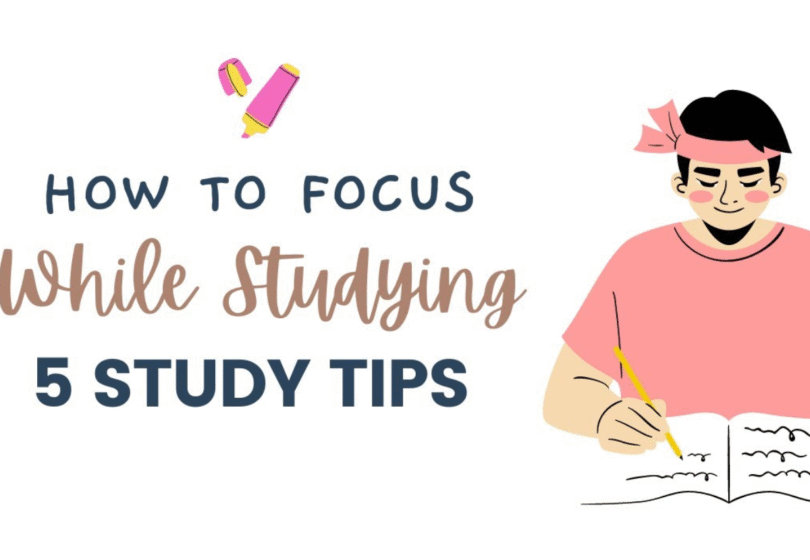Have you ever sat down to study, only to find yourself daydreaming or endlessly scrolling through your phone? You’re not alone. In today’s fast-paced digital world, learning how to focus while studying has become one of the biggest challenges for students of all ages.
But here’s the thing — focus is a skill. It’s not something you’re born with or without. The good news? You can train your mind to focus better with the right strategies, environment, and mindset.
In this article, I’m going to walk you through how to focus while studying, share proven methods, and also discuss the benefits and drawbacks of different focus techniques. Let’s dive in.
Why Is It Difficult to Focus While Studying?

Before we get to solutions, it’s important to understand why we lose focus:
- Digital Distractions: Constant notifications from phones, social media, and emails.
- Mental Overload: Too many tasks and no clear plan.
- Boring Study Materials: Some subjects just don’t excite us.
- Physical Fatigue: Lack of sleep, hunger, or dehydration affects concentration.
- Stress & Anxiety: Worrying about exams or deadlines scatters focus.
Now that we’ve identified the culprits, let’s talk about how to focus while studying effectively.
Detailed Tips on How to Focus While Studying
1. Design a Focus-Friendly Study Environment
Your surroundings matter. Find a quiet, clean space with good lighting. Make it inviting but not too comfortable (beds are a no-go!). Keep only what you need on your desk.
Extra Tip: If you’re in a noisy place, try white noise apps or calming instrumental playlists to block distractions.
2. Put Your Phone on Airplane Mode or Away
Phones are the biggest attention stealers. Place your phone in another room or use apps like Forest, Freedom, or Cold Turkey that block notifications and social media temporarily.
3. Master the Pomodoro Technique
This method involves:
- Studying for 25 minutes (a Pomodoro)
- Taking a 5-minute break
- After 4 Pomodoros, taking a longer 20-30 minute break
It works because it respects your brain’s natural attention span and prevents burnout.
Benefits:
- Improves time management.
- Keeps study sessions intense yet manageable.
Drawbacks:
- Might feel rigid for tasks that need deep, uninterrupted focus.
4. Set SMART Study Goals
SMART = Specific, Measurable, Achievable, Relevant, Time-bound.
Instead of saying, “I’ll study math today,” say, “I will solve 10 algebra questions in the next 30 minutes.” Clear goals help keep you on track.
Benefits:
- Gives a clear purpose.
- Keeps you motivated.
Drawbacks:
- Over-planning small tasks can feel overwhelming for some.
5. Organize Your Study Materials Beforehand
Nothing kills focus like getting up every 5 minutes to find a pen or book. Before you begin, gather everything you need: books, notes, water, pens, etc.
6. Feed Your Brain
A hungry or dehydrated brain can’t focus. Snack on brain foods like nuts, fruits, or dark chocolate. Don’t forget to hydrate.
Benefits:
- Boosts mental alertness.
- Keeps energy levels stable.
Drawbacks:
- Heavy meals can cause drowsiness, so eat light.
You may also like to read these posts:
Open Educational Resources (OER): Everything You Need to Know
Effective Study Techniques: Your Complete Guide to Smarter Learning
The Future of Tech in Schools: A Complete Guide to What’s Next
Study Hacks for Students: Detailed Guide to Study Smarter, Not Harder
7. Practice Mindfulness & Deep Breathing
When you catch your mind drifting, pause. Take 10 deep breaths, focusing only on your breathing. This simple exercise resets your attention.
Benefits:
- Reduces stress.
- Trains your brain to come back to the present moment.
Drawbacks:
- Requires regular practice to be effective.
8. Incorporate Active Learning
Passive reading often leads to mind-wandering. Instead:
- Take notes in your own words.
- Teach the topic to an imaginary audience.
- Use flashcards or mind maps.
Benefits:
- Improves retention.
- Keeps you mentally engaged.
Drawbacks:
- Takes more effort than passive reading but pays off in the long run.
9. Use Rewards to Stay Motivated
Reward yourself after completing study sessions. It could be a 10-minute YouTube break, a favorite snack, or a short walk.
Benefits:
- Boosts motivation.
- Makes studying feel less like a chore.
Drawbacks:
- Over-rewarding can become a distraction if not managed properly.
Benefits of Learning How to Focus While Studying

Mastering the art of focus comes with several long-term advantages:
- Better Academic Performance: You understand and retain information faster.
- Time Efficiency: You study smarter, not longer.
- Reduced Stress Levels: You don’t have to cram last-minute because you’ve been consistent.
- Increased Self-Discipline: Helps in other life areas, not just academics.
- More Free Time: Focused studying means more time for hobbies, relaxation, and socializing.
Drawbacks & Challenges You May Face
While learning how to focus while studying is powerful, there are some challenges:
- It Takes Time: Building focus is like building a muscle—it requires patience.
- Some Distractions Are Uncontrollable: Family noise, emergencies, or sudden disruptions can happen.
- Initial Resistance: Your brain may resist new habits at first, making it feel like a struggle.
- Perfection Trap: Trying to be 100% focused all the time can become stressful. It’s important to allow yourself to be human.
A Realistic Approach: It’s About Progress, Not Perfection
Here’s the most important thing I want you to remember: you don’t need to be perfect. Some days will be easier than others. The goal is not to eliminate distractions entirely but to reduce them enough so you can study effectively.
Start small. Implement one or two strategies and build from there. Over time, you’ll notice that your ability to focus while studying becomes stronger and more natural.
FAQs
Q1: How can I stop my mind from wandering while studying?
Q2: Is it okay to listen to music while studying?
Q3: How long should I study in one sitting for maximum focus?
Q4: What can I do to reduce phone distractions while studying?
Place it in a different room if possible.
Use focus apps like Forest, Freedom, or Cold Turkey to block distracting apps and websites while you study.








